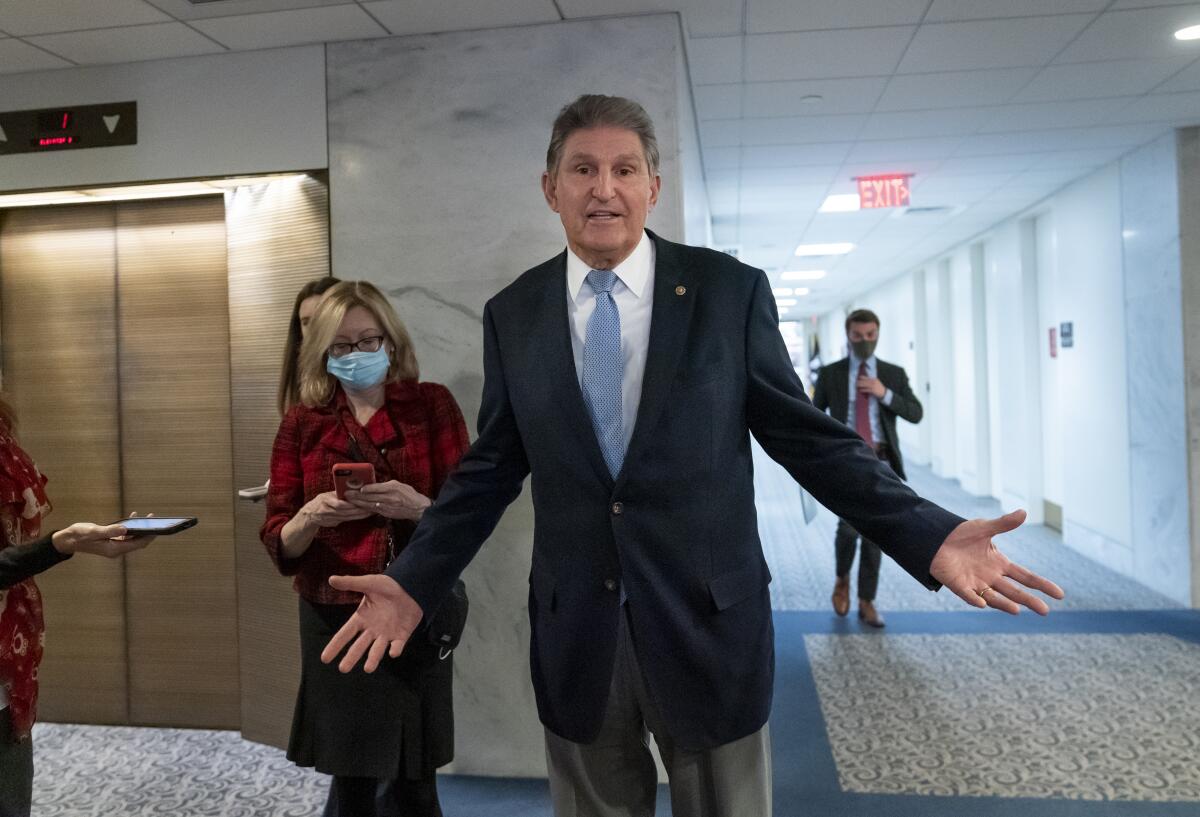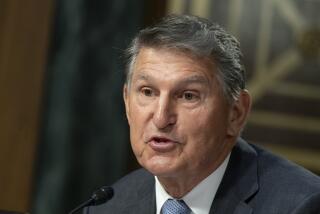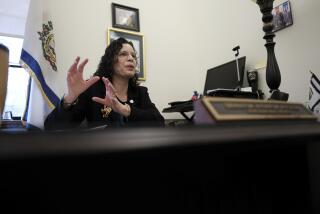Column: West Virginians needed Biden’s plan. Their senator defied them

For nearly 11 minutes, Sen. Joe Manchin and “Fox News Sunday” host Bret Baier talked about the stunning announcement Manchin had just made: He would vote no on a pillar of President Biden’s social policy agenda for the 21st century economy, dooming it after months of negotiations with his fellow Democrats.
In all that time, the two men didn’t discuss a single provision of the $1.75-trillion, 10-year “Build Back Better” bill.
Not the extension of a child tax credit projected to cut poverty among children in half. Nor transformative investments in child care and home care for the aged and disabled. Nor provisions expanding the Affordable Care Act to insure millions more low-income Americans and reducing prescription drug costs, for insulin in particular. Nor proposals for universal pre-kindergarten and college aid. Nor $550 billion in clean energy tax incentives, the nation’s largest effort to date against climate change.
Opinion Columnist
Jackie Calmes
Jackie Calmes brings a critical eye to the national political scene. She has decades of experience covering the White House and Congress.
And, interestingly, no mention of a program for black lung victims and incentives to entice manufacturers to bring new jobs to coal country. The next day, the United Mine Workers union issued a sharp rebuke of Manchin, the purported champion of mine workers, urging him “to revisit his opposition to this legislation” given its provisions, which its members and their communities desperately need.
That’s been the trouble with this debate from the start: Lost in the attention to the bill’s price tag and to Republicans’ false cries of “socialism!” is a close look at just what’s under the hood.
What Manchin should have been talking about was the substance of the package. And why a senator from West Virginia — a state that ranks 49th in personal income, fourth in the percentage of residents in poverty, third in people 65 and older, first in residents under 65 with disabilities, 47th in healthcare and 45th in education — would oppose a government hand-up that would help his small state of 1.8 million more than it would most states.
Two days before he dropped his bomb on Fox, a story in the state capital newspaper, the Charleston Gazette-Mail, was headlined “‘We need this so bad’: Build Back Better backers say bill would protect WV’s most vulnerable as Manchin resists.”
The West Virginians quoted singled out the monthly payments families have received from the temporary child credit, part of a pandemic relief law signed in March. For years, said Sarah Brown, a mother of three and managing attorney at a nonprofit law firm, “I’ve heard countless stories of West Virginians struggling to make ends meet, forgoing food to pay for medication, not filling prescribed medication to pay for food, picking which utilities to pay that month to avoid a shutoff.”
Others spoke of their need for the bill’s promised help in caring for children and disabled or elderly family members so they can continue to hold jobs.
Yet there was Manchin saying on Fox News that he decided to oppose the bill because “If I can’t go home and explain it to the people of West Virginia, I can’t vote for it.”
He can’t explain it?
Last month, 181,000 payments based on the child credit, averaging $438, benefited 305,000 children in Manchin’s state, according to Treasury Department data. A survey of West Virginians by Washington University and Appalachian State University found that of the nearly 70% of residents who received the payments, 43% used their money to pay down debts, 37% spent it mostly on food, clothing, rent and essential bills, and 20% mostly saved it.
Now, because of Manchin’s opposition — and the opposition of all 50 Senate Republicans including West Virginia’s other senator, Shelley Moore Capito — December’s payments are the last. Without them, a projected 22,000 West Virginia children will fall back below the poverty line, according to an analysis by the liberal Center on Budget and Policy Priorities.
Merry Christmas and a happy new year?
In a compromise Manchin reportedly offered Biden last week, he cut out the child credit, a Democratic priority. He has objected repeatedly that the bill understates the credit’s cost by extending it for just a year, because future political pressures would probably dictate that it live on. Maybe it would, but Democrats have said they would offset costs for any future extensions of that provision or others, just as they have for this entire package (which Republicans did not do when they passed the multitrillion-dollar Trump tax cuts in 2017).
There’s more to Manchin’s opposition. He has told Senate colleagues privately that too many of his constituents are looking for “free stuff” from Washington, and much of the money from the child payments would just buy more drugs in towns ravaged by opioids.
I’ll stipulate that Manchin should get some slack. He’s a Democrat who’s managed to get reelected in a state Donald Trump won overwhelmingly twice. Without him, Democrats wouldn’t have the Senate majority and wouldn’t have passed the pandemic relief and infrastructure laws and confirmed a record number of federal judges for a president’s first year. Given our polarized politics, even many West Virginians who stand to benefit from the “Build Back Better” bill would surely join Trump and Republicans in condemning it as socialism.
But, but, but. Stock markets slid Monday after Manchin’s comments. Goldman Sachs reduced its growth estimates, and Moody’s Analytics’ chief economist warned of economic risks ahead without the Biden bill being enacted.
So much for capitalists celebrating a blow against socialism. Maybe the protests from corporate America and the United Mine Workers will cause Manchin to reconsider. His needy constituents clearly could not.
More to Read
A cure for the common opinion
Get thought-provoking perspectives with our weekly newsletter.
You may occasionally receive promotional content from the Los Angeles Times.












